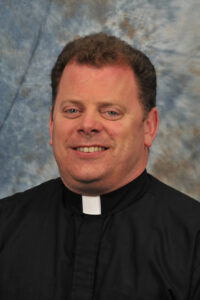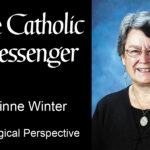By Father Jeff Belger
I knew it was going to be a long and difficult conversation. Mary was trying to maintain composure, but the emotion inside was winning. She asked if I had time to talk. By the time we reached my office, the tears began to flow. It was another story of “freedom” run amuck. She thought that compromise on her part would gain emotional intimacy on his. The conversation she overheard the next day confirmed what her conscience was already attacking her with. What started as a genuine desire for relationship and authentic intimacy had fallen into a broken relationship and shame. What is it about relationship that is so complicated? Why is it so difficult to get “right”?

Let’s start with the basic truth. We all have been created for relationship. God has loved us into existence. He has created us with the capacity, and the freedom, to love and to be loved. And we find fulfillment in doing just that: loving and being loved. The challenge then is to know what freedom and love truly mean and to live in both. The challenge is to know that to truly love we must be in relationship with the one who is Love.
Our culture subscribes to the mindset of freedom as the ability to do whatever a person wants to do. It ignores consequences of action or inaction and focuses on short-term desire. “I want” translates into: “I must!” Our culture also subscribes to the mindset of love as a commodity, or a possession. Something to buy, sell or trade. I will give something so that I can get something.
Now compare this understanding of freedom and love with what the church teaches. The more one does what is good, the freer one becomes. There is no true freedom except in the service of what is good and just. The choice to disobey and do evil is an abuse of freedom and leads to “the slavery of sin” (CCC No. 1733). My favorite definition of love comes from St. Thomas Aquinas. To love is to will the good of the other, for their sake.
At the University of Iowa, there are roughly 30,000 undergraduates who are navigating the desire to love and to be loved. For the vast majority of these students, college is an experience of being away from their hometown where they are known, away from parents who hold them accountable and, for some, away from the church which speaks of virtue and vice. It’s like coming to the world’s best summer camp, only to find out that the counselors have the night off.
Whether your experience of romance is positive, non-existent or wounded, as was the experience of the woman in my office, there is good news. God’s love for you is great and powerful. He can heal the broken-hearted and strengthen the weary. The key on our part is intentionality and trust in the Lord. I say, “Trust in the Lord,” not just to keep this a Catholic article. I say it because it is God’s plan. He literally wrote the book on love.
The expression, “falling in love,” is misleading. It is often used to describe the joy and surprise of a new romantic relationship. But in every other use of the phrase “falling in…” that I can think of, it means unintentional, undesired and usually leads to a trip to the hospital or at least a change of clothes. For some, the desire for intentionality leads to a decision to hit the pause button for a time.
This year, the Newman Center has teamed up with the Fellowship of Catholic University Students, FOCUS. The organization has sent a team of four recent college graduates as full-time missionaries to walk alongside our college students in pursuit of a relationship with God.
Two of our missionaries, in their first year working with FOCUS, are required to be on a one-year dating fast. Now why would these 20-something, fun-loving, incredible people want to put their romantic pursuits on hold for year? The answer: intentionality. In their decision to not date during that first year, they have also made the decision to intentionally pursue friendship with God, each other and with the students. This idea of intentionality is at the heart of every healthy relationship, especially romantic.
So, let’s go back to Mary. How would intentionality have helped in this situation? I would suggest four things:
• An intentional relationship with God.
• An intentional friendship with “sisters”— women striving for virtue.
• An intentional friendship with “brothers” — men striving for virtue.
• An intentional openness to pure romantic relationship.
To meet our desire for love, let’s stop falling in love and let’s start choosing love.
(Father Jeff Belger is director of the Newman Catholic Student Center and sacramental minister at St. Mary Parish in Iowa City. He is also associate director of vocations for the Diocese of Davenport.)











